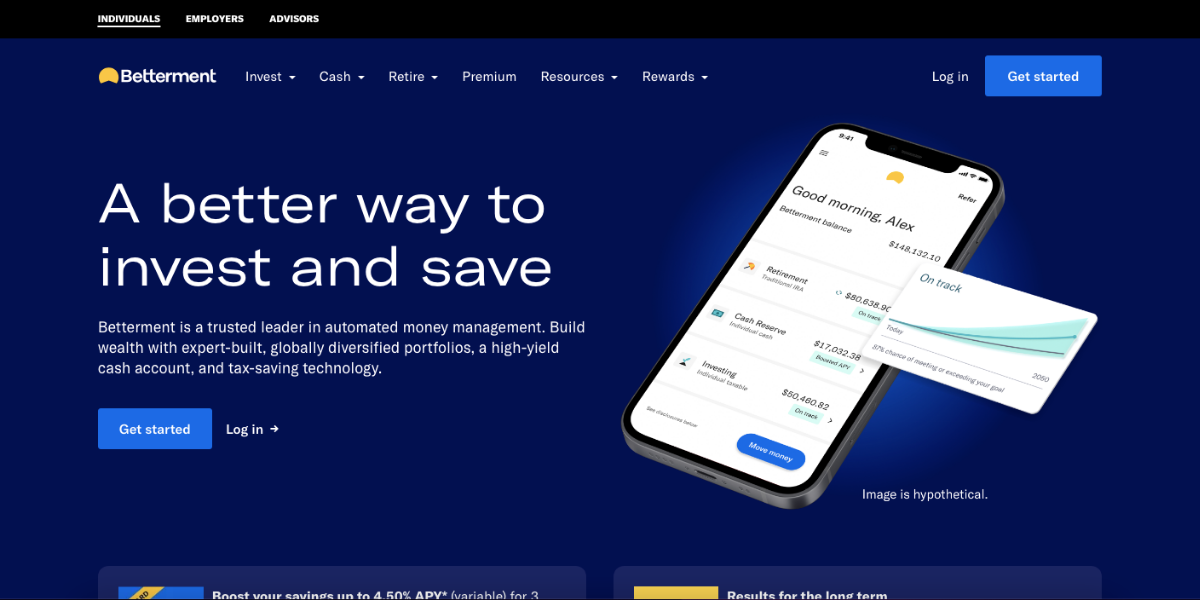What is Financial Security Anyway
You already do so much for others. Retirement planning is one powerful way to care for your future self.
I’ve never worked for someone who offered a 401(k) or any other type of retirement plan. Sometimes that security sounds appealing to me, especially during times of uncertainty (like the pandemic). However, the truth is that many people lost their jobs at that time, and many continue to lose their jobs to this day. So, how secure can an employee’s status be anyway?
The best way for us, as solo entrepreneurs, to secure our future is to plan for it ourselves. I derive most of my financial strategies from my dad, but I’ve also learned a lot from The Minimalists. So I ended up blending the two.
Betterment: Your Retirement Planning Hack
Against my dad’s recommendation, I took Joshua Fields Millburn’s advice and opened up a Betterment account in 2015, and I am so glad I did. Betterment is a robo-advisor that makes saving easy. I have earned a cumulative $126% on my investment. My internal rate of return is 9.6% and you’re supposed to gain an average of about 8% per year investing in the stock market (adjusted for what we lose with inflation).
In twelve years, I have 60% more money in my Roth IRA than I invested. That means that if I had invested $10,000 over those twelve years, my IRA in Betterment would be worth $16,000 today. If I had left that money in my savings account, I would have had about $10,200 (possibly even less), essentially losing money to inflation.
Consistency is Key
Now, don’t run to Betterment and move all your savings there at once. Here is where my dad comes in. He taught me that the smart way to invest in the stock market is to pick a dollar amount and invest that same amount every week. Markets will fluctuate, but they tend to trend upward over time. So, when you invest the same amount every week, you capture both the highs and the lows. You never have to worry about what the markets do day-to-day (who has time for that?). Over time, you are likely to win. If not, then money probably won’t have much value anyway, and good thing you have a skill! 😉
You can choose other options besides Betterment. I’ve dabbled with Vanguard and have some savings in the market there, but I find Betterment to be more straightforward than other financial apps I’ve tried. If I make extra money, I increase my weekly contributions. And when business is slower, I lower. Otherwise, my bank account is linked to my Betterment account, and it auto-drafts my contributions every week.
If you had a financial planner balancing indexes and stocks, and honestly, I’m not sure what all it takes to manage money manually, but they would charge around 3.0%. Betterment, on the other hand, charges around 0.15%—a lot less.
Where to Get More Info about Retirement Planning
In case you haven’t figured it out yet, I’m no financial guru. So, if I can do it, you can too.
I mentioned Joshua Fields Melburn over at The Minimalists. He provides a much more detailed explanation of how all of this retirement planning works in his blog post, where I learned about Betterment all those years ago. It’s worth checking out.
And if you want to know more about how the stock market should make you money over time, Nerd Wallet has a great article going in-depth on this topic.
Start Saving Today
The best advice I can give you about retirement planning is to start today! It’s never too late – or too early – to start saving. Betterment makes it incredibly easy to get started.
I have a safety net fund and a Roth IRA. I can’t touch the IRA until it “matures” when I’m 68. With a Roth IRA, I invest my already taxed money (which is not eligible for a tax break). But the great thing about it is that when it’s time to retire, I don’t pay taxes on any gains I make over those decades.
While you can’t take out your IRA for a while, you can create other accounts that you can take money out of at any time. Let me tell you, my safety net saved me during the COVID-19 pandemic. I know people who are still trying to pay off loans from the pandemic era (which carry interest rates). Whereas I am working on building my safety net back up, week by week (earning on my contributions, rather than paying interest on a loan). Money goes a lot farther when you wait to spend once you have it (especially when you leave it growing in the market) versus taking out a loan.
Eliminate Debt
And if you have debt, especially high-interest debt, create a plan to pay it off first. If you’re accruing 17.99% interest every month in credit card debt, it doesn’t make sense to put money in the market where you’re earning an average of 8%.
Implement a plan to pay a specific amount of money each month toward your debt until it is fully paid off. Then, when your debt is gone, start investing that dollar amount into your Betterment account or whatever account you choose.
Retirement planning can be straightforward. Pick one option. Set up one account. Start small. Then build from there.






0 Comments